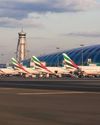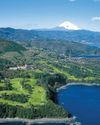Central Asia’s most populous country is ready to welcome the world.

As the plane landed at Tashkent airport after the six-hour flight from Seoul, I tried to rev up my travel-weary brain (I’d started the journey in Hong Kong) for the travails that lay ahead and shake off the food coma induced by Korean Air’s filling but stodgy economy class beef bibimbap.
I had been warned – and read, to my angst, in online forums – that going through the rigmarole of Uzbekistani customs and immigration would test even the most stoic of travellers: foreign currencies had to be declared to the last cent; voluminous arrival forms had to be completed in Uzbek or Russian, with no English translation available; and the queues could last several hours, even though the passenger flows at Islam Karimov International Airport are not exactly Heathrow-esque.
But, apparently, things have changed in the former Soviet country. The Cyrillic forms were nowhere to be seen, the line for passport control was mercifully short, and the immigration officer who stamped my passport was cheerily efficient. “Enjoy Uzbekistan,” he said as I began my first trip to Central Asia’s most populous nation – and, until recently, one of the world’s most authoritarian and repressive states.
Having worked as a foreign correspondent in Asia for a decade, I have grown tired of clichéd descriptions of emerging markets at a “turning point”, yet it is hard to talk about Uzbekistan today without using some similar form of words. Gulf links are growing too, with fly-dubai starting five-times weekly flights to Tashkent from March 11, which will rise to daily from May 31.
Two years after the death of long-ruling dictator Islam Karimov, this country of 32 million is going through the juddering first phases of the sort of reform and opening-up process that has transformed the economies and societies of countries like China and Vietnam.
この記事は Business Traveller Middle East の March 2019 版に掲載されています。
7 日間の Magzter GOLD 無料トライアルを開始して、何千もの厳選されたプレミアム ストーリー、9,000 以上の雑誌や新聞にアクセスしてください。
すでに購読者です ? サインイン
この記事は Business Traveller Middle East の March 2019 版に掲載されています。
7 日間の Magzter GOLD 無料トライアルを開始して、何千もの厳選されたプレミアム ストーリー、9,000 以上の雑誌や新聞にアクセスしてください。
すでに購読者です? サインイン

Onwards and upwards
In an exclusive interview with Ian Fairservice for Business Traveller, His Highness Sheikh Ahmed bin Saeed Al Maktoum, President of the Dubai Civil Aviation Authority and CEO and Founder of the Emirates Group, provides insight into the current and future state of travel and Emirates’ pivotal role in getting the industry back on track

Cleaning up the crisis
How hotels have risen to the challenge of keeping guests safe during the pandemic

The Great Vegas Meetings Magic Act
The city is working hard to conjure up events and make millions of visitors reappear

TAKES OFF
Corporations are seeking new travel solutions that put safety and convenience first

TEE TIME IN TOKYO
The Tokyo Olympics may be delayed, but the golf courses around Japan’s capital aren’t slowing down

KEYS TO THE KINGDOM
New and upcoming hotels to check out when you next visit Saudi Arabia

QATAR CALLING
A swathe of hotels are opening in the Gulf State in the run-up to the 2022 FIFA World Cup

MEMPHIS CON BRIO
Music and history flood through the heart and soul of this quintessential American river town

Sofitel Mumbai BKC
BACKGROUND Sofitel Mumbai BKC is one of Accor’s most prominent addresses in Mumbai, Maharashtra. The French hospitality group’s other hotels in the city are operated under the Novotel and ibis brands.

Taking Scotland in Stride
A walk through the Highlands and Borders is the best way to touch this country’s history and nature